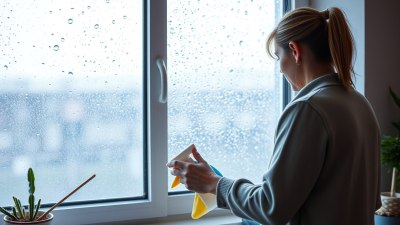Why You Always Start Cleaning When It Finally Cools Down
Discover why the cooler weather inspires your cleaning habits and how to make the most of it.

Image created with Flux Schnell
When the temperatures begin to drop and the oppressive heat of summer fades away, many people suddenly find themselves motivated to tackle the home cleaning projects they've been postponing. This seasonal shift prompts a noticeable uptick in activity around households as people open windows, dust off forgotten corners, and organize spaces with renewed energy. But why does this cooling down of weather so consistently inspire a surge in domestic productivity?
The answer lies in a complex interplay of psychological, environmental, and cultural factors that prime individuals for this burst of cleanliness once the heat relents down to more tolerable levels. From natural physiological responses to shifts in mood, to social routines and traditional practices, plenty of variables contribute to why the onset of cooler weather is synonymous with the desire to clean thoroughly.
Understanding this phenomenon can not only explain the sudden drive to wield brooms and mops but also help harness this motivation strategically to maintain a healthier and more comfortable living environment throughout the seasons.
Seasonal Changes Affect Energy and Focus
During the hot summer months, our bodies naturally conserve energy to deal with the stress of heat, which can be physically draining. High temperatures often cause lethargy, reduce motivation, and make physically demanding tasks such as deep cleaning seem more daunting than usual. Conversely, the arrival of cooler temperatures triggers an uptick in energy levels and mental clarity. The brain functions more efficiently in a comfortable climate, reducing fatigue and improving concentration, which are critical components when undertaking methodical tasks like cleaning.
This environmental comfort facilitates prolonged periods of focus and effort without the distracting discomfort of sweat and overheating. As a result, cooler weather contributes directly to increased productivity and enthusiasm for tackling chores that might have been neglected or delayed during the sweltering heat.
Psychological Renewal Associated with Seasonal Shifts
The transition to a cooler climate is often accompanied by a psychological sense of renewal and readiness to reset, commonly linked to the concept of seasonal cycles impacting human behavior. Psychologists have noted that individuals often experience shifts in mood and motivation correlated with seasonal changes, a phenomenon termed Seasonal Affective Response. While predominantly discussed concerning winter depression, subtle mood improvements and boosted motivation as temperatures moderate can occur after enduring the harshness of summer heat.
This improvement in emotional state fosters proactive behavior and a desire to create order and cleanliness within one’s environment. The symbolic aspect of changing seasons encourages people to engage in activities that represent a form of personal or domestic renewal, with cleaning being a tangible way to manifest this psychological refresh.
Cultural Traditions Influencing Cleaning Patterns
Various cultural traditions worldwide incorporate seasonal cleaning rituals that can influence individuals irrespective of their conscious awareness. For example, the well-known practice of spring cleaning aligns with the end of winter in many temperate regions. Similarly, the approach of fall often signals an opportunity to prepare the home for winter by clearing out dust, debris, and accumulated clutter.
These traditions instill habitual behaviors and societal expectations that shine a spotlight on periods of the year optimal for cleaning. The cultural reinforcement of associating cooler weather with preparing the home for the upcoming season contributes to why there is a heightened focus on cleanliness during this time.
The Practical Necessity of Preparing for Winter
From a practical standpoint, colder weather necessitates preparing one’s living environment for harsher conditions. Clearing out dust and debris helps with air quality, which becomes more critical when windows are closed and indoor heating systems are in use. Organizing and cleaning also ensure that living spaces operate efficiently without dust accumulation affecting heaters or humidifiers.
The cooler months may also require readying wardrobes, bedding, and other household items, naturally resulting in a burst of activity linked to cleansing spaces and setting everything in order. This preparation is not only about comfort but also about health, reducing allergens and preventing mold growth that adopts a foothold in less ventilated rooms as temperatures fall.
Behavioral Patterns and Habit Formation
Behavioral science indicates that habit formation is heavily tied to environmental cues. The cooling climate acts as a seasonal prompt that triggers an ingrained response to focus on cleanliness. These cues coupled with the practical advantages and cultural reinforcement lead to a repeated pattern that solidifies over time. Once cleaning during cooler transitions becomes routine, it serves as a psychological anchor, enhancing consistency in domestic upkeep.
Moreover, the satisfaction derived from a cleaned and organized space reinforces the habit, creating a positive feedback loop that sustains cleaning motivation during the cooler months. Recognizing these behavioral patterns can empower households to structure their cleaning schedules effectively, using seasonal markers as reminders.
Emotional Comfort Derived from a Clean Environment
A clean living environment has profound effects on emotional well-being, contributing to feelings of control, calm, and happiness. During times of seasonal change, when routines might be disrupted, and the days grow shorter and darker, maintaining a tidy space can provide a stable sanctuary. The act of cleaning itself can be therapeutic, offering a sense of achievement and purposeful activity.
This emotional comfort becomes particularly desirable as people spend more time indoors in cooler weather. Achieving a clean and cozy home environment supports emotional resilience and can act as a buffer against seasonal stressors, reinforcing why individuals are drawn to cleaning when outdoor conditions are less inviting.
Improved Air Quality and Health Benefits
The impact of cooler weather on ventilation patterns in the home also drives cleaning behavior. During summer, frequent airing of spaces through open windows often prevents the build-up of indoor allergens and pollutants. When the weather cools, windows tend to remain closed, leading to potential stagnation and accumulation of dust, pet dander, and other allergens.
Deep cleaning at this time helps to mitigate health risks such as respiratory issues and allergies by removing contaminants before they exacerbate symptoms. Thus, health-conscious individuals are motivated to clean more thoroughly as a preventive measure during the cooler months, linking the environmental change directly to cleaning behavior.
Social Influence and Seasonal Hosting
Cooler months often coincide with social gatherings and holidays that bring people into homes more frequently. Preparing one's home to welcome guests in a clean, orderly condition becomes a natural catalyst for increased cleaning activity. This social dimension adds an external motivation beyond personal preference, reinforcing the seasonal cleaning surge.
Recognizing the cultural importance of cleanliness during festive periods motivates individuals to clean thoroughly in anticipation of hosting family or friends. This social dynamic not only promotes immediate cleanliness but can enhance long-term maintenance habits by associating positive memories with a tidy environment.
Climate-Related Limitations and Opportunities
Climate also imposes physical limitations that affect cleaning habits. For instance, in hot climates, outdoor cleaning chores may be deferred until cooler days to avoid heat exhaustion. Interior deep cleaning involving strenuous effort or the use of water commonly left until temperatures moderate are examples of such practical scheduling.
Similarly, in regions with distinct seasonal cycles, the cleaning calendar aligns with periods that present the fewest obstacles related to weather. Leveraging these windows optimizes the efficiency and safety of cleaning activities, explaining the perceptible rise in cleaning efforts when it cools down.
Strategies to Maintain Cleanliness Year-Round
While the natural inclination is to intensify cleaning in cooler weather, maintaining a consistent cleaning routine throughout all seasons can enhance both health and comfort. Integrating smaller, manageable cleaning tasks during hotter periods helps prevent overwhelming build-ups that necessitate extensive seasonal overhauls.
Utilizing climate-specific cleaning approaches, such as prioritizing dust control in cooler months and moisture management during warm periods, ensures a balanced and effective maintenance schedule. Establishing these year-round habits reduces the pressure and labor intensity when the seasons change, offering a more sustainable approach to household cleanliness.
Leveraging Cooling Down Periods for Effective Cleaning
Understanding that cooler weather signals a natural boost in cleaning motivation can help households plan strategically. Scheduling cleaning projects during these times takes advantage of increased physical comfort, improved focus, and cultural momentum to accomplish significant tasks efficiently.
Preparing checklists and prioritizing areas most impacted by seasonal shifts, such as heating vents, carpets, and windows, can maximize the benefits of cleaning efforts. Aligning these projects with the cooler weather cycle transforms the seasonal cleaning instinct into a purposeful and rewarding routine.











